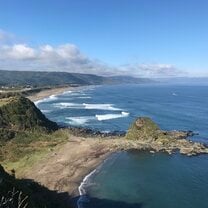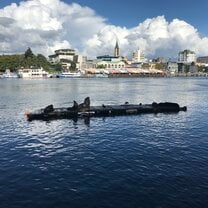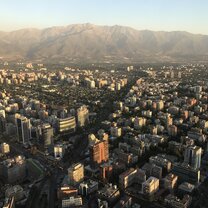I spent from July - December of 2017 participating in the Human Rights Track, a collaborative program between Middlebury C.V. Starr Schools Abroad and the Universidad Alberto Hurtado in Santiago. The track, designed to offer students the opportunity to gain a holistic and multidimensional understanding of the history of human rights in Chile, includes two Chilean university courses, one Middlebury College Spanish writing and grammar course, an independent research project, and an internship.
The beauty of this program is in the flexibility that it gives to students to craft their academic and cultural experience. I chose to approach learning about human rights through the focus of music and social movements and was able to use Santiago as my classroom, traveling to different parts of the city to conduct interviews with musicologists and historians for my research project. I got to work directly with children in some of Santiago’s most marginalized communities through my internship, which I was paired with by Middlebury's Chilean program directors.
I am very satisfied with the balance the program struck by giving me the independence to tailor my own learning experience while also providing the structure and resources to keep me in the right direction. The Chilean program team inspired unwavering confidence in me as they made themselves available in every way to support me throughout my semester. Whether for academic, personal, or logistical reasons, I knew that I could always count on them to be responsive and empathetic.
Santiago, like any huge city, is what you make of it. Though parts of the city may seem gray and commercial, I adapted to the bustle of the big metropolis and appreciated wholeheartedly all of the culture and growing diversity. Not only was I surrounded by tons of live music events, festivals, theaters and cultural centers, and different restaurants, I was a short bus ride from breath-taking nature reserves, state parks, and other culturally-rich cities like Valparaíso and Viña del Mar. The airport is 40-minute drive from downtown Santiago, making other parts of the country accessible by plane.
I mentioned the city's growing diversity above. Santiago, over the past couple of decades, has been experiencing a significant influx in immigration from countries like Peru, Colombia, Venezuela and Haiti. Much of my internship work followed organizations that are helping integrate native-born Chileans with their migrant neighbors and building healthy and inclusive communities. While many Chileans are eager to welcome this growing diversity, there are also many who choose to meet migrants with discrimination. This is an evolving phenomenon in Chile, and is especially visible in Santiago.
For those students looking to improve their Spanish, this is an incredibly worthwhile program. Like all Middlebury College abroad programs, one must abide by a language pledge and commit them self to only speaking Spanish for the entirety of the semester. Though challenging at points, I found the pledge to be extremely effective. I began my semester fairly confident in my Spanish-speaking abilities, but felt like the language flowed naturally after five months of being immersed in the program.
Chileans’ form of speaking is quite unique as it is very quick and full of phrases that are only used in Chile, but with a positive and easygoing attitude one can adapt to this mode of speaking and make many friends with Chileans in the process (many people I met loved to teach me new phrases and were very patient).
I invite those undergraduate students excited by the idea of having a fully immersive cultural and academic experience in a vibrant and bustling city to consider this program. Overall, I had a extremely enriching and enjoyable semester and remain grateful for the support by the Chilean program directors.
















